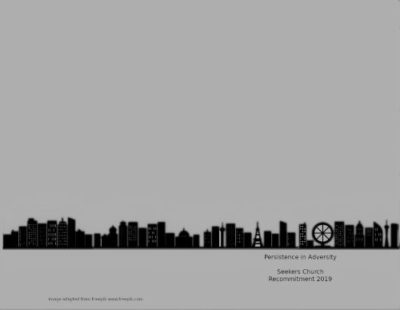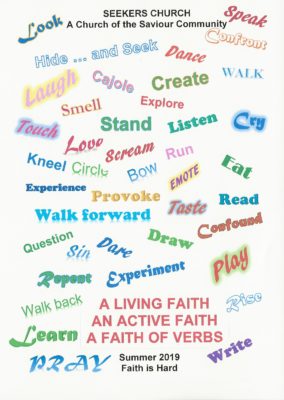Sermons
Seekers recognizes that any member of the community may be called upon by God to give us the Word, and thus we have an open pulpit with a different preacher each week. Sermons preached at Seekers, as well as sermons preached by Seekers at other churches or events, are posted here, beginning with the most recent.
Click here for an archive of our sermons.
Feel free to use what is helpful from these sermons. We only ask that when substantial portions are abstracted or used in a written work, please credit Seekers Church and the author, and cite the URL.
.wp-show-posts-columns#wpsp-4136 {margin-left: -2em; }.wp-show-posts-columns#wpsp-4136 .wp-show-posts-inner {margin: 0 0 2em 2em; } I am a member of the Learners and Teachers Mission Group. Members of this Mission Group traditionally offer sermons during recommitment season, the time leading up to Recommitment Sunday. During this time, we Seekers are all asked to review our commitment to God and to Seekers Church. Some key questions that we are advised to ask ourselves are: When Learners and Teachers divided among ourselves the available dates for preaching, I ended up with what is arguably the most difficult to understand of Jesus’s parables — The Shrewd Manager, The Dishonest Steward, or The Unjust Steward, as it is variously called. I tried to switch to a different date but the other dates were all taken. I was stuck with it. In this parable, a rich man seems to be praising an employee who he has fired for mismanaging his accounts. He praises the manager even though the manager has shortchanged him by collecting reduced amounts from the rich man’s debtors in order to ensure their good will in the future. The rich man says: “And I tell you, make friends for yourselves by means of dishonest wealth so that when it is gone, they may welcome you into the eternal homes.” What?? Claire McBride spoke on how her own journey led her to understand that she is not separate from the earth. She said it is easy to get parched, to fall into despair and grief around climate change, but there is still room for great hope. Noting that climate justice is interwoven with all other justice issues, she reminded the congregation of God’s promise in Revelation 21, “Behold, I am making all things new.” The text of this sermon is not available at this time. I’m not a big fan of calling the lectionary’s excerpt from the Hebrew Scriptures or the Epistle a “lesson.” Sometimes the excerpt does instruct us but sometimes it’s an invitation for us to engage with or even wrestle with God’s word. But I really cringe when I hear a liturgist say the “Gospel lesson” because the gospel is never a lesson. It is always good news. That’s what the word ”gospel” means – good news. So, as we begin recommitment season don’t you feel excited by Luke’s good news of Jesus’ words that we just heard? We must hate our families and even our own lives to become disciples of Jesus! Hooray! We must pick up and carry our cross to follow him! Glory hallelujah! We must renounce all our possessions, not just declutter with Marie Kondo! Whoopee! Today’s passage is frequently called a “hard gospel.” After our Learners and Teachers mission group discussion on this passage this week John Morris explored the Greek and found that there are two words in Greek for “hate.” Luke used the word “miseo” (the root of “misogyny”), which was most often used when a comparison was implied; that is, “to hate your mother and father” might be a strong way of saying, “to prefer [something or someone else] over them,” or “to hold less affection for them than for [the other thing].” To prefer Jesus over our families is still stronger than merely psychologically detaching from our parents and individuating ourselves from our siblings, spouses, and children. In Jesus’ day, family is where one found his or her identity, and so to be told that they must prefer Jesus to their families must have been deeply shocking to his disciples. And who wants to be called by God to be a martyr? Who wants to be homeless and have nothing? Please pray with me for a moment. Holy One, let the words of my mouth and the ideas they express make sense in the minds and hearts of my hearers. Beyond this, dear loving God, may these words strengthen our connection with you and with each other and support us as we seek to love and serve your broken world. Amen. It’s been a real challenge for me working with our liturgical theme for the current season, which ends today. That theme, “Faith is Hard” has evoked for me a phrase my father used frequently in his preaching. More than once I heard him tell his congregation that “it’s a harsh Gospel.” Usually this was followed by a kind of pregnant pause, to make sure his hearers didn’t mentally brush by the truth he was uttering: It’s a hard Gospel. Glendale Burton was a Disciples of Christ pastor who, for 23 years, served a church in Arlington. Among other distressing, at least to me, aspects of his life and ministry was his blatant plagiarism of the preaching of other pastors. He quoted, without attribution, not just brief passages and illustrations, but fully developed ideas and multiple paragraphs of text as though they were his own, when they came from the published, or at least mimeographed, sermons of others. So I have no idea if “it’s a harsh Gospel” was original with him or not. But however that may be, the phrase catches the same spirit as our theme, “Faith is Hard.” It is in the context of this theme that I want to look at our lections: Jeremiah’s prophecy about the faithlessness of his people and its consequences, Jesus’s exchange with his Pharisee host about the proper invitees to a dinner or luncheon, and the reading from Hebrews which “connects our relationship with God with our relationships with one another,” thus providing a context of community within which to deal with the “hard” issues. I’m going to talk with y’all this morning about salvation in the midst of tragedy. Let’s see what we can learn from the prophet Jeremiah. Jeremiah began his prophetic challenges in 627 BCE, about 650 years before the prophetic challenges of Jesus. Jeremiah was an educated priest well acquainted with the Torah, with the histories such as the book of Kings, with the Psalms and Proverbs. He knew about the tragedies of the destruction and ravaging of Israel, the ten Northern Tribes, from Hosea and other prophets. It wasn’t a stretch for him to worry about the rise of Babylon and the threat posed to Judah, and Jerusalem its capitol city. Jeremiah’s witness was in Jerusalem and began during the reign of Josiah the boy king which began twenty-two years earlier. Josiah was raised in a priestly family. Priests acted as regents while Josiah grew up. The priests “discovered” Deuteronomy, meaning they wrote Deuteronomy, which became the fifth book of the Torah about three hundred years after the writing of Torah began. The priests, including Jeremiah, promoted the Deuteronomic spiritual revolution. Jeremiah, however, was not so interested in the revisions of customs and worship but rather in the injustices that continued in the kingdom. He criticized the powers in Jerusalem, and the people, for not paying enough attention to injustice, and that led to being remembered as a prophet. He also warned about the dangers of rising Babylon. Salvation, for Jeremiah, was to be had by living out the guidance of Torah, particularly the spiritual revolution centered on Deuteronomy. Is Christianity, is the United States, facing tragedies on the scale of the destruction and ravaging of Israel and Judah? Is our Christian faith, as we explore it and practice it in Seekers, able to unflinchingly face such tragic dangers? Would those of us who survive be able to deepen our faith as we live into and through such a tragedy?“Being a Wise Steward” by Jacqie Wallen
 September 22, 2019
September 22, 2019The Fifteenth Sunday after Pentecost
A Sermon for “Climate in the Pulpit Sunday” by Claire McBride
 September 15, 2019
September 15, 2019The Fourteenth Sunday after Pentecost
“The Good News of Recommitment Season” by Dave Lloyd
 September 8, 2019
September 8, 2019The Thirteenth Sunday after Pentecost
“Faith is Hard” by Ken Burton
 September 1, 2019
September 1, 2019The Twelfth Sunday after Pentecost
“Salvation in the Midst of Tragedy” by Pat Conover
 August 25, 2019
August 25, 2019The Eleventh Sunday after Pentecost